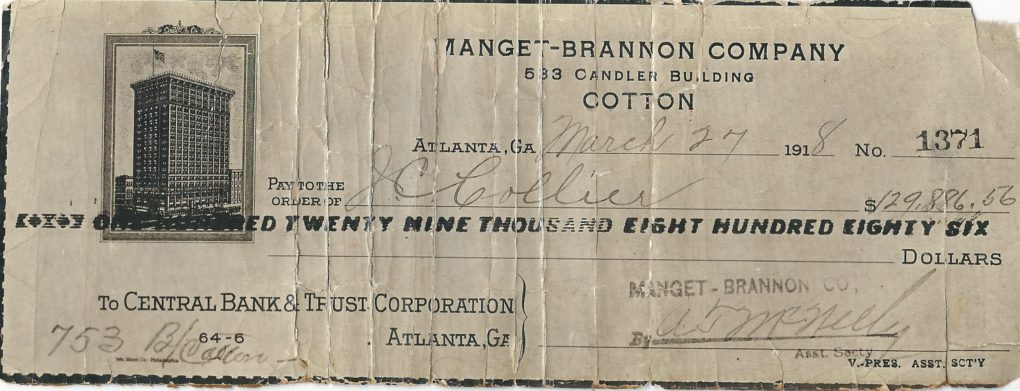Originally Posted July 6, 2019
Isaac Cuthbert (I. C.) Collier died July 11, 1908. Upon his death, his son, Jena Cuthbert (J. C.) Collier inherited the 3,000-acre farm at the village of Piedmont in what was then Pike County, Georgia. Having made his mark as an extremely enterprising and successful dry goods merchant, J. C. suggests in his letters he felt there was no future in farm life. He often wrote, although he was born in rural Piedmont, he left the farm in his early teens and grew to maturity in the town of Barnesville. His advice to young men was to leave the farm, move to the city, and obtain a job with a large company. This sounds like odd advice from a man who excelled in farming, receiving a check for his cotton in 1918 that, at the time, was the largest ever for Middle Georgia. The amount is equivalent to more than two million dollars in 2019 money (see September 17, 2016 post: Can You Believe It?? A Check For Over 2 Million Dollars!!).

J. C. was widely recognized as an authority on growing and marketing cotton. He was successful in farming because he practiced proven methodology, introduced structure, and demanded accountability in his huge farming enterprise. No doubt these things had given him success in other endeavors.
The Collier Farm at Piedmont was actually several adjoining farms situated where Little Potato Creek flowed into Big Potato Creek. Water and rich bottom land soil were plentiful.
The village of Piedmont was in the center of the sprawling Collier acreage. The farm completely surrounded Piedmont, with its railroad depot, two schools, two churches, dry goods store, post office, blacksmith shop, clay pottery factory, and cotton gin. The village derived its life from the Collier Farm and its workers and families. Southern Railway ran through the village, providing easy access to shipping, travel, and mail. At least two trains per day passed through Piedmont. Barnesville, Georgia was located some ten miles away by unimproved dirt road or by rail.

The genius of J. C. Collier is seen in the way he used the resources around him to his best advantage. J. C. hired an overseer to manage his farms while he tended his textile mill and dry goods operations in Barnesville. The overseer was required to submit both Daily and Weekly Farm Reports. The reports were on printed forms with required entries. Note that this was in the early 1900s. The reports were placed on the train at Piedmont and delivered to J. C. in Barnesville. He typically worked late hours at the mill and reviewed the reports at that time.


Many farms of the era used sharecroppers who farmed the land for a percentage of the crop. Groceries and other staple needs of the sharecropper and his family were often charged on the landowner’s accounts at local stores. The debts were settled at harvest time. J. C. selectively used sharecroppers, but he preferred to hire his farm workers on a daily basis and pay them every week in cash. This opportunity for immediate payment attracted eager workers.
J. C. Collier died in 1944. His ancient roll top desk, the contents of which were said to have been unchanged since his death, was inventoried by CHF in 2014. Items in the drawers and pigeon holes reflect his focus on work and give a glimpse of the things that he considered important. One of the items he apparently felt significant was a faded copy of a letter he wrote in 1909. In the letter, he clearly, but diplomatically, laid out the responsibilities of his farm overseer. Apparently J. C. had earlier verbalized his requirements, but he saw the need to put them in writing. Added notes indicate the overseer failed, the farm suffered financially, and J. C. terminated him. Perhaps this letter reminded J. C. to be precise in his expectations, to be firm in making difficult management decisions, and to avoid financial loss.
This was my first overseer of farms . . . after my Father’s death and he lost me about $4,000.00 and was fired in Aug. 1909. J C Collier
Barnesville, Ga. July 16, 1909.
Dear Jim:-
I have thought carefully over the way things appear to me and in the future, I request that you apply the following in the handling of my business.
1st: Give every minute of your time to the field hands, keep your eyes on them.
2nd: Personally see that the feeding is properly done and that my feed stuff is better taken care of.
3rd: Do not allow the hands to become indebted to you as I prefer to pay them the cash so as to demand good labor.
4th: I don’t like for my plows, when not in use, to remain in the fields and in the rain, but see that the plows, axes, hoes, mower, rake, & wagons are put where they belong.
5th: See that I get value received for money paid to the laborers.
6th: Salt my mules every Sunday.
7th: Grease my harness and bridles every two or three months.
8th: See all croppers and renters once each week and report any short comings on their part to me.
9th: See that all gates going into the horse lot are locked every night and keys in your possession, back gate as well as on front.
10th: To make money and succeed, economy and watchfulness of property and time is as necessary as hard work.
I talked these things over with you before, but I now put them on paper as you can keep same as a reference to know how I wish you to carry on my business.
Very truly,
J.C. Collier
Report every Monday night in writing the work done the previous week – farms visited – condition of crops of each tenant.
